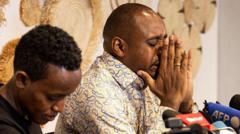Boniface Mwangi shares his traumatic story of alleged sexual torture and abuse while in Tanzania, highlighting the repressive climate against activists. His case, along with Ugandan activist Agather Atuhaire's similar experiences, calls for urgent international attention and accountability from Tanzanian authorities as the nation heads into a contentious election period.
"Kenyan Activist Reveals Allegations of Torture After Detention in Tanzania"

"Kenyan Activist Reveals Allegations of Torture After Detention in Tanzania"
A Kenyan activist speaks out about his harrowing experience of alleged torture and sexual assault while detained in Tanzania, raising serious concerns about the country's human rights practices.
Kenyan activist Boniface Mwangi has come forward with a deeply distressing account of his detention in Tanzania, where he claims he was subjected to sexual torture. Speaking to the BBC, Mwangi expressed that he is “struggling to be alive” following the traumatic events he endured last month. He traveled to Tanzania to support opposition leader Tundu Lissu, who is currently embroiled in legal battles.
At a press conference in Nairobi, Mwangi recounted being stripped, hung upside down, and beaten while also facing horrific sexual assaults. Tanzania's police chief, Jumanne Muliro, dismissed Mwangi's claims as mere "hearsay" and urged him to formally report the matter for investigation.
The political landscape in Tanzania has been increasingly troubled, especially approaching the presidential and parliamentary elections in October. Rights organizations have decried the government's escalating repression against dissent. Amnesty International has called for accountability from officials responsible for the alleged brutal treatment of activists.
Mwangi was not alone in his ordeal; Ugandan activist Agather Atuhaire, who was detained alongside him, has also alleged she was raped during her confinement. Both activists were reportedly detained for several days, during which Mwangi said he was informed that torturers were filming the assaults and would leak the content if he dared to speak out about his experiences.
Stuck in a mental torment, Mwangi shared that the torture has left him haunted by nightmares and a persistent fear of being killed, revealing the psychological impacts of such brutality. He is now advocating for his medical records to be made public, hoping to prevent similar atrocities from transpiring in the future.
This distressing situation arose while Mwangi and Atuhaire were advocating for Lissu’s case, emphasizing that the current political environment disallows free and fair elections, a claim the government denies. Even President Hassan of Tanzania has warned activists from neighboring countries against interfering in the affairs of Tanzania.
The event sparked international outcry, with the U.S. Department of State expressing deep concern regarding the treatment of the activists. Prominent Kenyan public figures like Martha Karua and former Chief Justice Willy Mutunga faced deportation attempts when trying to show support for the detained activists.
Ultimately, Mwangi's narrative serves as a potent reminder of the ongoing struggles for freedom and justice in East Africa, encouraging a collective movement toward accountability and reform amid growing oppression.






















